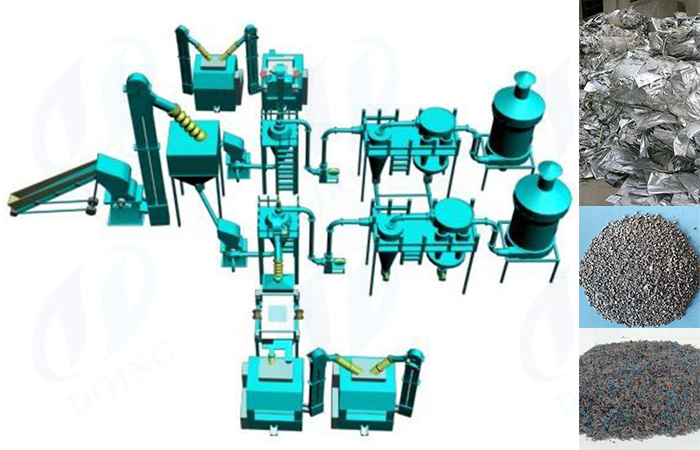Brazil breaks aluminum recycling record
Industry News / Date:January 24, 2018

Aluminum recycling machine
Brazil, the world's biggest collector of aluminum cans, broke its own record for recycling the material in 2014, the Brazilian Aluminum Association, or Abal, said.
The numbers can be attributed to the rising costs of energy and the fragility of an economy plagued by recession and accelerating inflation, Abal said.
Energy costs for industries have risen, making the production of primary aluminum more expensive and, in turn, driving the metal's recycling rate up to 98.4 percent, or 1.3 percentage points more than in 2013, when a record was set.
During the 12 months ending March 31, the cost of energy in Brazil increased 60 percent, the Brazilian Institute of Geography and Statistics, or IBGE, said.
"Aluminum production migrates to where energy is cheaper and, unfortunately, we are going through deindustrialization of primary aluminum," Mario Fernandez, coordinator of Abal's Recycling Market Committee, told EFE.
"The industries that stick to producing primary aluminum are those that produce their own energy or, otherwise, they would not be able to continue," Fernandez said.
Production of secondary aluminum from recycled material consumes 95 percent less energy, Fernandez said.
"Unfortunately, secondary aluminum is limited," Fernandez said. "We are already up to 500,000 tons per year and there's no way to collect much more without importing scrap metal, something we are already doing."
Brazil, according to Abal figures, consumes 1.4 million tons of aluminum each year, with 33 percent of the material going into cans for beverages and other products.
In the next few years, Fernandez said, there could be a new surge in demand for aluminum in the country.
"The first aluminum boom in Brazil was for packaging, and the second will be for motor vehicles, which, to comply with legislation, must reduce carbon emissions, something that can be done only through changes in fuel, or by reducing the weight using aluminum," Fernandez said.
Brazil's cars have an average of 30 kilos (66 pounds) of aluminum in them, compared to 150 kilos (330 pounds) per car in the U.S. auto industry.
"The room for expansion in Brazil is huge," Fernandez said.
Between 2013 and 2014, sales of aluminum cans in Brazil increased 11 percent, compared to a growth rate of 12.5 percent for recycled aluminum, placing the South American country ahead of Japan, the United States and Europe, Abal said.
The widespread recycling in Brazil is driven by the poor, who organize cooperatives to collect cans, with the activity often being the only source of income for families.
Angela Gonzaga, president of the recycling cooperative in the Moreira Cesar district of Pindamonhangaba, located 100 kilometers (62 miles) northeast of Sao Paulo, told EFE that people in Brazil did not separate materials, which reach landfills all dirty or mixed with other materials, such as paper.
"If we had a bit more support to raise the population's awareness, our work would be better, it would yield much more," Gonzaga said, adding that one-fifth of cooperative members worked on separating materials, which is a waste of time and a loss of efficiency.
Request Information
Send your inquiry for further information





